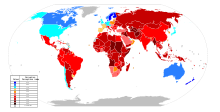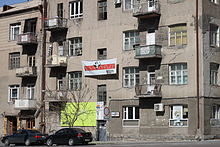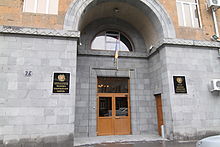- Corruption in Armenia
-
Political corruption 
Corruption Perceptions Index, 2010Concepts Electoral fraud · Economics of corruption
Nepotism · Bribery · Cronyism · Slush fundCorruption by country Angola · Armenia · Canada
Chile · China (PRC) · Colombia
Cuba · Ghana · India · Iran · Kenya
Ireland · Nigeria · Pakistan
Paraguay · Philippines · Russia
South Africa · Ukraine · Venezuela
· United StatesPolitical corruption in Armenia is a widespread and growing problem in Armenian society. The United Nations Development Programme in Armenia views corruption in Armenia as "a serious challenge to its development."[1]
Contents
Corruption levels
In 2008, Transparency International reduced its Corruption Perceptions Index for Armenia from 3.0 in 2007[2] to 2.9 out of 10 (a lower score means more perceived corruption); Armenia slipped from 99th place in 2007 to 109th out of 180 countries surveyed (on a par with Argentina, Belize, Moldova, Solomon Islands, and Vanuatu).[3] Despite legislative revisions in relation to elections and party financing, corruption either persists or has re-emerged in new forms.[4]
Institutions
The main anti-corruption institutions of the Armenian government are an Anti-Corruption Council – headed by the prime minister – and the Anti-Corruption Strategy Monitoring Commission, established in June 2004 to strengthen the implementation of anticorruption policy. However, these institutions scarcely functioned in 2006-2007, even though they were supposed to meet twice-quarterly and monthly, respectively.[2]
History
The late Prime Minister Andranik Margarian launched Armenia’s first post-Soviet campaign against corruption in 2003. The initiative, however, has been widely disparaged for being short on results.[5] Current Prime Minister Tigran Sargsyan has acknowledged that corruption is Armenia’s "number one problem that obstructs all our reforms."[5]
The government has recently launched an anti-graft campaign which has been accompanied by changes in customs regulations, reported tax police inspections of companies owned by pro-government businesspeople and numerous high-profile firings of people in the tax department, customs service and police. The recent crackdown on corruption has received mixed reactions.[5]
Misappropriation of international loans
In March 2004, an ad hoc commission of the Armenian parliament investigating the use of a $30 million World Bank loan concluded that mismanagement and corruption among government officials and private firms was the reason of the failure of the program to upgrade Yerevan's battered water infrastructure.[6] The World Bank issued the loan in 1999 in order to improve Yerevan residents' access to drinking water. The government promised to ensure around-the-clock water supplies to the vast majority of households by 2004, but as of 2008, most city residents continue to have running water for only several hours a day.[6]
Veolia Environnement, the French utility giant that took over Yerevan's loss-making water and sewerage network in 2006, has said that it will need a decade to end water rationing.[6] In August 2007, Bruce Tasker, a Yerevan-based British engineer who had participated in the parliamentary inquiry as an expert, publicly implicated not only Armenian officials and businessmen but also World Bank representatives in Yerevan in the alleged misuse of the loan. In an October 4, 2007 news conference, the World Bank Yerevan office head Aristomene Varoudakis denyied the allegations, claiming that the World Bank disclosed fully all information available on the project to the parliamentary commission and that based on this information there was no evidence of fraud or mismanagement in the project.[6]
Illegitimate use of eminent domain
Eminent domain laws[7] have been used to forcefully remove residents, business owners, and land owners from their property. The projects that finally are built on the site are not of state interest, but rather are privately owned by the same authorities who have executed the eminent domain clause. A prominent example is the development of Yerevan's central Northern Avenue area. Another involves an ongoing project (as of November 2008) to construct a trade center near Yerevan's botanical garden. The new land owners are non other than Yerevan's mayor Yervand Zakharyan and Deputy Mayor Karen Davtyan, who was at one time Director of the Armenian Development Agency and successfully executed the eviction of residents on Northern Avenue.[8]
Tax and customs agencies
In 2007, World Bank economists pointed to serious problems with rule of law and widespread corruption in the Armenian tax and customs agencies.[9]
References
- ^ "Strengthening Cooperation between the National Assembly, Civil Society and the Media in the Fight Against Corruption", Speech by Ms. Consuelo Vidal, (UN RC / UNDP RR), April 6, 2006.
- ^ a b Global Corruption Report 2008, Transparency International, Chapter 7.4, p. 225.
- ^ 2008 CORRUPTION PERCEPTIONS INDEX, Transparency International, 2008.
- ^ Global Corruption Report 2008, Transparency International, Chapter 7, p. 122.
- ^ a b c "ARMENIA: GETTING SERIOUS ABOUT CORRUPTION?", EurasiaNet, July 11, 2008.
- ^ a b c d Corruption Chronicles: International Loans, Eurasianet.org, 2008.
- ^ The Constitution of the Republic of Armenia (27 November 2005), Chapter 2: Fundamental Human and Civil Rights and Freedoms, Article 31
- ^ The Yerevan Municipality Allocates a Parcel of Land to one of its Employees under the Guise of “Eminent Domain”, Hetq Online, November 10, 2008.
- ^ World Bank Urges ‘Second Generation Reforms’ In Armenia, Armenia Liberty (RFE/RL), March 20, 2007.
 Armenia topics
Armenia topicsHistory (timeline) EarlyOrigins · Name · Kura-Araxes culture · Hayk · Hayasa-Azzi · Mitanni · Nairi · Kingdom of Urartu · Orontid dynasty · Kingdom of Armenia · Roman Armenia · Byzantine Armenia · Bagratuni Armenia · Armenian Kingdom of CiliciaMiddleModernBy topicGovernment and
politicsConstitution · President · Prime Minister · National Assembly · Political parties · Elections · Foreign relations · Corruption · Human rights · LGBT rights · Relations with the European Union · more on government / politicsEconomy Armenian dram · Central Bank · List of companies · Armex · Agriculture · Industry · Communications · Transport · Energy · Mining · Waste management · International rankingsAdministrative
divisionsArmed Forces Geography Demographics Religion Culture Symbols Corruption in Asia Sovereign
states- Afghanistan
- Armenia
- Azerbaijan
- Bahrain
- Bangladesh
- Bhutan
- Brunei
- Burma (Myanmar)
- Cambodia
- People's Republic of China
- Cyprus
- East Timor (Timor-Leste)
- Egypt
- Georgia
- India
- Indonesia
- Iran
- Iraq
- Israel
- Japan
- Jordan
- Kazakhstan
- North Korea
- South Korea
- Kuwait
- Kyrgyzstan
- Laos
- Lebanon
- Malaysia
- Maldives
- Mongolia
- Nepal
- Oman
- Pakistan
- Philippines
- Qatar
- Russia
- Saudi Arabia
- Singapore
- Sri Lanka
- Syria
- Tajikistan
- Thailand
- Turkey
- Turkmenistan
- United Arab Emirates
- Uzbekistan
- Vietnam
- Yemen
States with limited
recognition- Abkhazia
- Nagorno-Karabakh
- Northern Cyprus
- Palestine
- Republic of China (Taiwan)
- South Ossetia
Dependencies and
other territories- Christmas Island
- Cocos (Keeling) Islands
- Hong Kong
- Macau
Categories:
Wikimedia Foundation. 2010.


